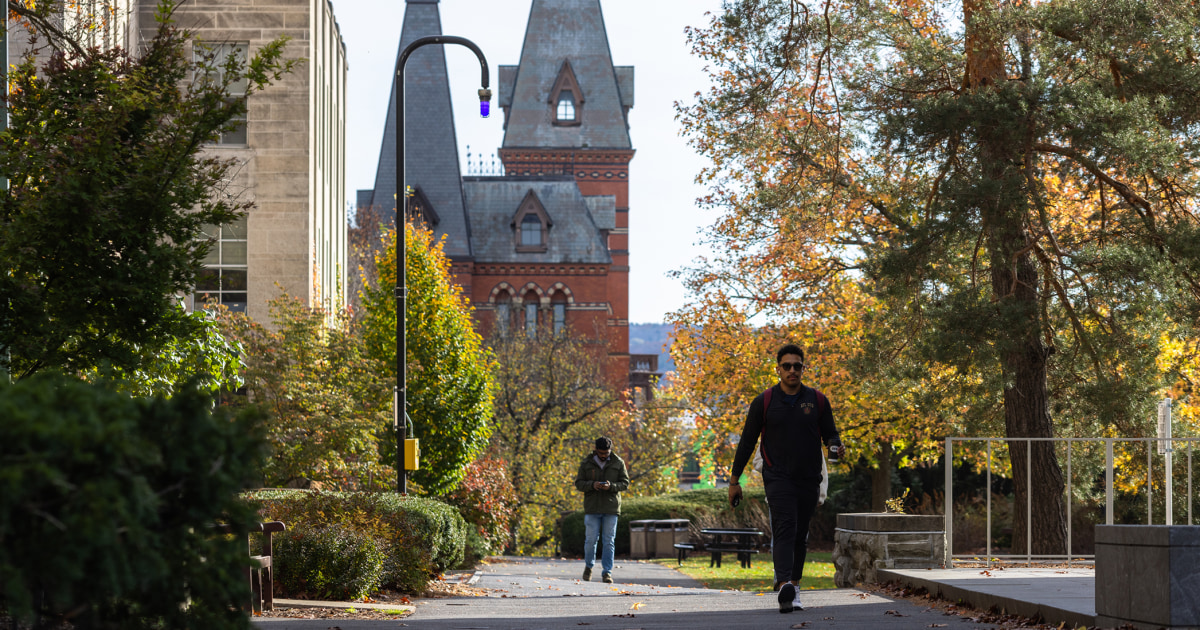As she prepared to leave for winter vacation, Tracey Pauline Albert, a master’s student at Columbia University originally from India, took no chances with her return plans. Her flight back to the U.S. was carefully scheduled to land well before Jan. 20.
Columbia is one of a handful of U.S. colleges and universities that have been cautioning their international student bodies to return to campus early to avoid any travel delays. Some schools are specifically advising students to arrive before President-elect Donald Trump’s inauguration on Jan. 20.
The University of Southern California, Cornell University, Harvard University and the Massachusetts Institute of Technology are among the schools that have advised concerned students to return to campus early.
“There is a palpable sense of anxiety among internationals regarding the ambiguity surrounding immigration policies,” Albert, who is studying for a Master of Public Administration, told NBC News via email. “Small adjustments, like ensuring one is back in the U.S. before key dates such as January 20th, are manageable. However, the question of what comes after remains.”
For students like Albert, who carefully navigate the complexities of living and studying in the U.S., the looming uncertainty of Trump’s second term has reignited fears of travel bans and stricter immigration rules.
Schools say they are attempting to help, providing resources for visa holders and saying they can help mobilize in the event of an emergency.
“Based on previous experience with travel bans that were enacted in the first Trump Administration … the Office of Global Affairs is making this advisory out of an abundance of caution,” a University of Massachusetts Amherst office wrote on Instagram. “We are not able to speculate on what a travel ban will look like if enacted, nor can we speculate on what particular countries or regions of the world may or may not be affected.”
Though not directly referencing inauguration, a note from Harvard said that it’s monitoring immigration policy closely. It encouraged international students to arrive well before the start of the semester.
Referencing Trump’s Muslim travel ban, which was first put into effect just days after he took office in 2017, Cornell encouraged students to carry their papers with them at all times when traveling. “Ensure that they are up to date, and bring additional paperwork demonstrating your purpose at Cornell,” the university wrote.
Lingering Muslim ban-driven fears
Trump’s initial executive order, signed a week into his first term, barred all travelers from seven Muslim-majority countries for 90 days. It left some students and faculty who were out of town stranded or held at the airport.
“For most of the students, they were essentially stopped from boarding the flight,” said Gaurav Khanna, an associate professor of economics and immigration scholar at the University of California, San Diego. “There were a lot of students who did get detained. Some, for instance, if they were transiting through Canada, they couldn’t get on the last leg.”
The ban was ruled unconstitutional, but was ultimately upheld by the Supreme Court in 2018. President Joe Biden repealed it when he took office in 2021. Though it’s unclear whether Trump will reinstate the ban, students have expressed concern over past controversial statements he’s made about deporting protesters on college campuses.
“When I am president, we will not allow our colleges to be taken over by violent radicals,” Trump said at a rally in New Jersey earlier this year. “If you come here from another country and try to bring jihadism or anti-Americanism or antisemitism to our campuses, we will immediately deport you.”
Though the largest numbers of international students in the U.S. come from India and China, experts say even the fear of potential bans could create a chilling effect on enrollment at universities. For Chinese students especially, this post-Covid fear coincides with a dip in their enrollment numbers at U.S. schools.
“Given the tensions with China and the large number of students from China, there is this uncertainty,” Khanna said. “That can hurt not just the students, but the universities broadly. Even if the administration doesn’t actually end up doing anything in the short run, that fear might not go away for a while, and as a result it’s going to hurt enrollment.”

